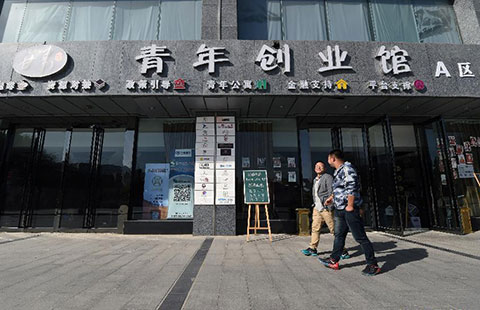Low inflation data reverses winning streak in equities
(Agencies) Updated: 2015-10-15 14:10Deflation fears intensify as below-target Sept CPI raises concern about long-term growth
China's stocks fell for the first time in six days, dragged down by technology and consumer companies, after inflation data signaled more weakness in the world's second-biggest economy.
The Shanghai Composite Index slid 0.9 percent to 3,262.44 points at the close, halting the longest stretch of gains since July.
The consumer price index rose 1.6 percent in September, compared with the 1.8 percent median estimate. The producer price index fell 5.9 percent, extending its streak of negative readings to 43 months.
"China is still in an industrial deflationary trajectory," said Dai Ming, a fund manager at Hengsheng Asset Management Co in Shanghai, who's adding to stock holdings.
"The government will continue to stimulate growth through monetary and fiscal policies, probably at a measured pace."
With consumer inflation well below the government target of 3 percent all year, the central bank has further capacity to spur lending even after cutting interest rates five times since November.
The government data follow a trade report on Tuesday that showed a bigger-than-estimated plunge in imports in September and puts more pressure on policymakers to add to stimulus to meet their 7 percent growth target for the year.
The CSI 300 Index retreated 1.1 percent. The Hang Seng China Enterprises Index fell 1 percent, while the Hang Seng Index lost 0.7 percent. The Bloomberg China-US Equity Index, the measure of the most-traded US-listed Chinese companies, slid 0.8 percent in New York on Tuesday.
Wednesday's loss for the Shanghai gauge halted a 11 percent rebound since an August low. The rally has been fueled by speculation that China's central bank will ease monetary policy and policymakers may introduce more measures to boost growth.
- Wanda's Wang Jianlin takes back the richest crown from Alibaba's Jack Ma
- NDRC approves 218 fixed asset investment projects worth $285b
- China Jan-Sept outbound direct investment surges
- China-Pakistan Entrepreneurs International Seminar opens in Beijing
- China-Pakistan entrepreneurs' international seminar building platform to serve enterprises 'going global'
- Chinese companies eye Australia's leading beef producer
- Service industry helps with economic growth
- Pay system, e-commerce a good measure of spending

















